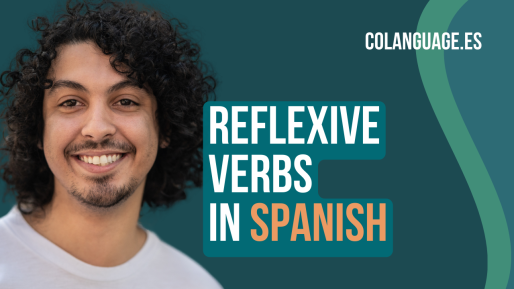Possessive adjectives in Spanish (my, your, mine, yours,...) Share Copied!
Spanish Family A1 To introduce oneself
In this lesson, we are going to learn the possessive adjectives in Spanish.
<< Familia (Family)
Video
Podcast
What are possessive adjectives?
Possessive adjectives emphasize possession and tell us who owns or has something. There are two types of possessive adjectives in Spanish depending on their placement in a sentence: the long-form and the short-form.
- Mi gato (My cat) short form
- Ese libro es mío (That book is mine) long from
Possessive adjectives before the noun
The short form of possessive adjectives in Spanish are always placed before the noun.
|
Possessive adjective (short form) |
Spanish | English |
|---|---|---|
| Mi | Mi perro | My dog |
| Tu | Tu hermana | Your sister |
| Su | Su libro | His (or her) book |
| Nuestro/-a | Nuestra familia | Our family |
| Vuestro/-a |
Vuestro padre |
Your father |
| Su | Su abuela | Their grandmother |
To form the plural of possessive adjectives, you only need to add an "s" at the end.
Tu hermana (Your sister) Tus hermanas (Your sisters)
Listening exercise
You can practise the short form of possessive adjectives with this exercise.
| Spanish | English | |
|---|---|---|
| María | ¿Cómo está tu hermana? | How is your sister? |
| Daniel | Mi hermana está bien, está trabajando en su proyecto. | My sister is doing well, she's working on her project. |
| María | ¡Qué bien! ¿Váis a venir a nuestra cena esta noche? | That's great! Are you all coming to our dinner tonight? |
| Daniel | Sí, voy a ir con mis padres. | Yes, I'm going with my parents. |
| María | ¿Van a estar tus hermanos también? | Will your siblings be there too? |
| Daniel | Sí, va a estar toda mi familia. | Yes, my whole family will be there. |
Possessive adjectives after the noun
The long form possessive adjectives in Spanish. They are placed after the noun.
|
Possessive adjective (long form) |
Spanish | English |
|---|---|---|
| Mío/-a | La casa es mía. | The house is mine. |
| Tuyo/-a | El gato es tuyo. | The cat is yours. |
|
Suyo/-a |
La mesa es suya. |
The table is hers (or his). |
| Nuestro/-a |
El barco es nuestro. |
The boat is ours. |
| Vuestro/-a | La maleta es vuestra. | The suitcase is yours. |
| Suyo/-a | El amigo es suyo. | The friend is theirs. |
Possessive adjectives agree with the thing they are describing, not the person owning that thing.
Las gafas son mías (The glasses are mine) The noun is feminine and plural, so the possessive adjective must agree too.
Listening exercise
Let's put into practise the long form of possessive adjectives in Spanish.
| Spanish | English | |
|---|---|---|
| María | ¿Has visto mis llaves por aquí? | Have you seen my keys around here? |
| Daniel | No, pero las mías están en la mesa. Puede que estén las tuyas también. | No, but mine are on the table. Yours might be here too. |
| María | Tampoco encuentro mi libro de español. ¿Lo has visto? | I also can't find my Spanish book. Have you seen it? |
| Daniel | No, pero el mío está en la estantería. | No, but mine is on the shelf. |
Key takeaways
Here is a quick summary of this lesson.
- Possessive adjectives tell us who owns something.
- They must agree with the noun they are describing.
- There are two types of possessive adjectives and their position in the sentence can change.
Subscribe to our social media channels to get free daily exercises!



